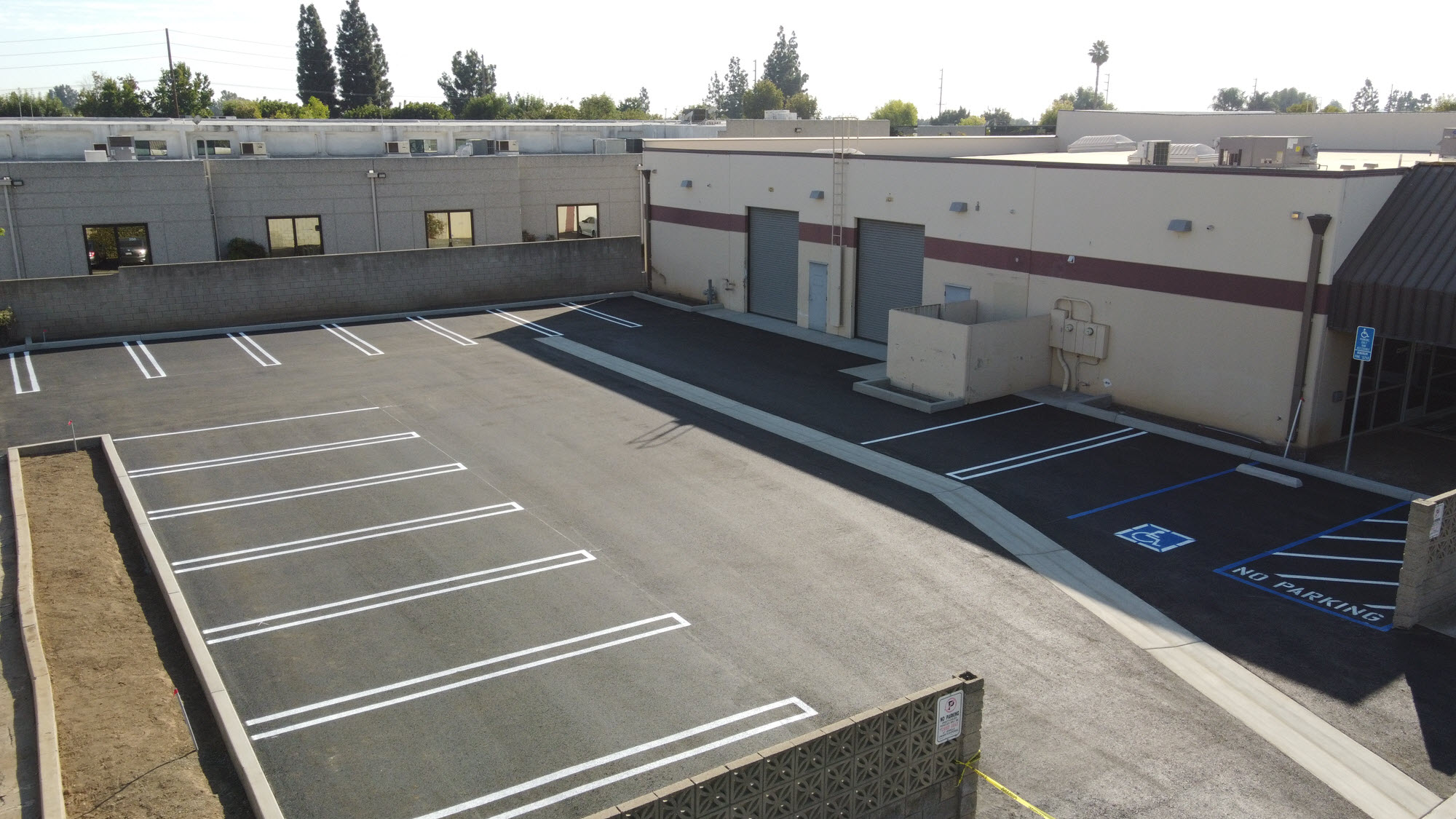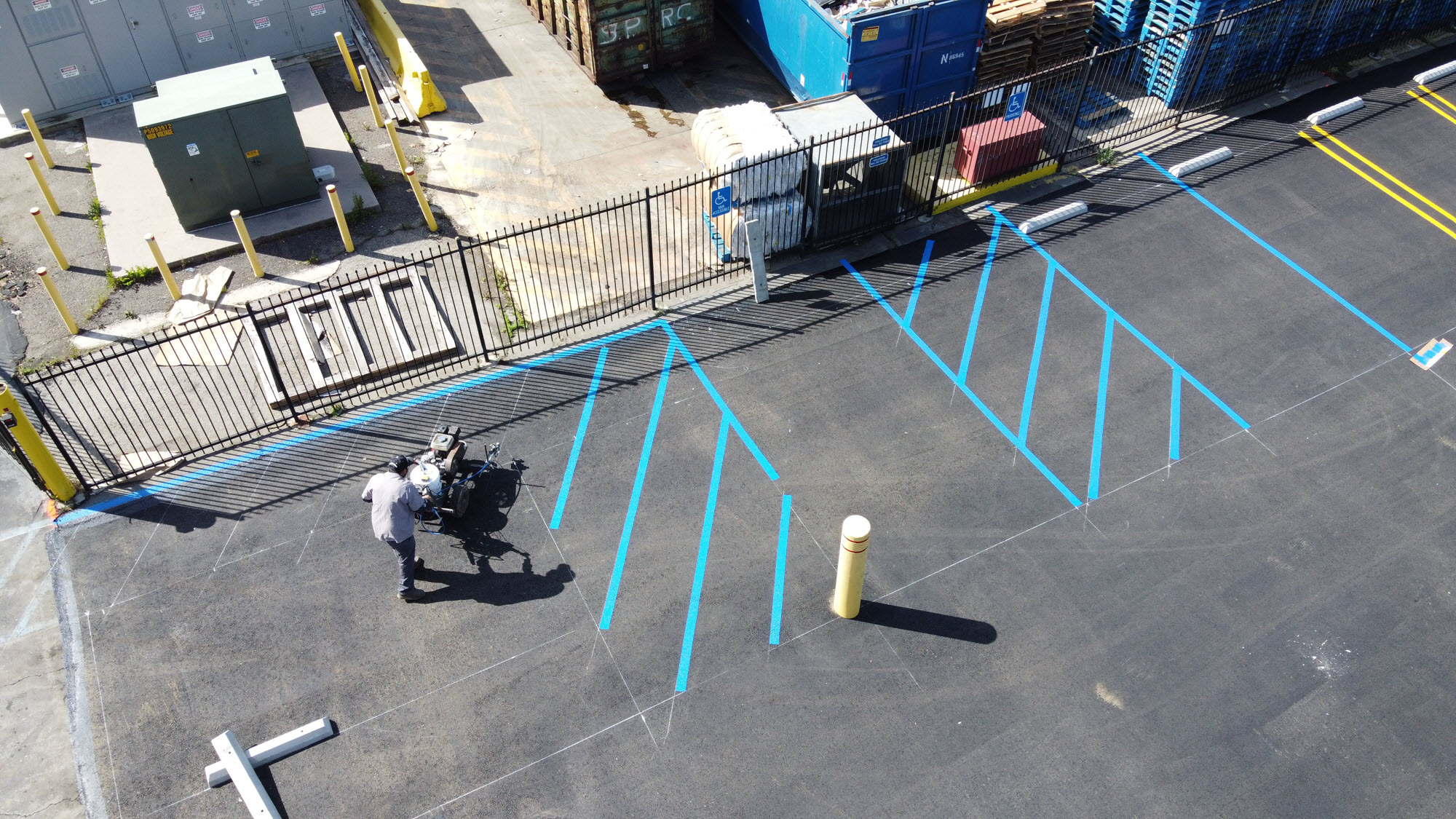How Often Should I Get Parking Lot Maintenance Done?
Posted on April 30, 2021 by Rafael CantilloOne question that a lot of property managers wonder about is: How often should I have parking lot servicing done at my business?
Granted, the answer depends on your specific needs and circumstances, as well as the condition of your parking lot. Another factor to keep in mind is the time of year. Some maintenance services are best performed in the spring and summer (sealcoat, striping), others in the fall and winter (crack sealing), and still others year-round (striping).
Let's talk about some key maintenance services that you should consider for your parking lot, along with the time frame for each one.

Sealcoat
Sealcoat is an emulsion of asphalt, water, and aggregate, and is spread on top of your asphalt by a squeegee or sprayer. Sealcoat provides more durability for your parking lot, as well as a nice, shiny appearance.
%20Castleton%20RE%3B%20Pomona%20Ranch%20Plaza%3B%20Pomona%20(19-685-19-688)%20(1).jpg?width=1632&name=(Phase%201)%20Castleton%20RE%3B%20Pomona%20Ranch%20Plaza%3B%20Pomona%20(19-685-19-688)%20(1).jpg)
How often should you sealcoat your lot?
If you've recently had an asphalt overlay for your parking lot, we would recommend allowing it to cure for about 6 months before applying the first layer of sealcoat. For ongoing maintenance, it's best to have your lot sealcoated every 2-3 years (or as needed).
Striping
There are a lot of different names for striping: line striping, parking lot painting, lot marking, etc. Whatever you like to call it, having clear, visible stripes on your lot is not only important for practical reasons (like making sure your lot can be filled to capacity), but it also enhances your lot's professional appearance, and ultimately your business's reputation.

How often should you stripe your lot?
In general, we recommend striping your lot every 2-3 years. By that time, at least some of your lines will probably have faded. Of course, if your lines begin to fade earlier than that, you can also schedule parking lot servicing to have it striped ahead of schedule.
Crack Filling/Sealing
There are a ton of reasons why your asphalt will crack. However, the main culprits usually boil down to sun and water. UV rays from the sun constantly beat down on your parking lot, causing its asphalt to dry out and become brittle. Eventually, small cracks form. Then, rain or runoff water seeps into those small cracks and begins the process of erosion — which eventually leads to the formation of a pothole. (Of course, cracks can also be formed because of earth movement, heavy traffic, poor construction design, or faulty repairs, to name just a few other causes.)
There are two basic kinds of crack sealants: hot pour and cold pour. At Empire Parking Lot Services, we believe that hot pour sealants are superior to their cold pour counterparts. In general, hot pour crack sealants are designed to repair cracks up to three-quarters of an inch in width. For most larger cracks, we usually recommend asphalt repair instead of crack sealing. (We do offer cold pour crack sealants for smaller jobs if budget constraints are involved; however, they are very limited in their effectiveness compared to hot pour materials.)
%20Troy%20CSL%20Lighting%3B%20Ind%20Bldg%3B%20City%20of%20Industry%20(19-616)%20IS%20(9).jpeg?width=2016&name=Copy%20of%20(+%20Cracks)%20Troy%20CSL%20Lighting%3B%20Ind%20Bldg%3B%20City%20of%20Industry%20(19-616)%20IS%20(9).jpeg)
How often should you crack-seal your lot?
Really, it's best to have cracks on your lot filled and sealed as soon as possible. Delaying this type of maintenance will only result in further erosion and damage to your lot, and may end up costing you more in the long run. Of course, crack filling/sealing parking lot servicing should always be done before a sealcoat is put on, if there are cracks present on the asphalt.
Wheel Stops
Wheel stops are a nice feature for any parking lot to have. They may provide an extra safety barrier if the edge of your parking lot is near a ditch or drop-off, and they can also help minor "fender-benders" from occurring as well.
Of course, these wheel stops can easily become a safety hazard if they fall into disrepair. For instance, if their rebar is exposed, urgent parking lot servicing is in order. It could present a serious impalement danger if someone were to trip and fall in its vicinity. And along with that danger comes the associated legal implications (think about the lawsuit that could result if someone trips on a broken wheel stop or suffers a severe injury from falling on top of a wheel stop with exposed rebar).
%20BL%20(1).jpg?width=2016&name=Cynthia%20Scarlata%3B%20Bac%20Street%20Lounge%3B%20Redondo%20Beach%20(19-677)%20BL%20(1).jpg)
How often should you repair/replace your wheel stops?
We definitely recommend that you repair or replace any damaged wheel stop as soon as possible — and especially if rebar is showing. It may also be a good idea to include your wheel stops on your checklist for your annual inspection, if you haven't done so already.
Other Parking Lot Servicing Options
There are several other miscellaneous maintenance services that your parking lot may need over the years. For instance, signs on your parking lot, posts, bollards, and other structures may need to be repaired if a vehicle smashes into them, or they suffer damage from another source. And it's always important to make sure that your handicap signs are where they need to be in order to remain compliant. Even one wrongly placed handicap sign may mean the difference between getting sued and avoiding trouble.
Reach Out to Empire Parking Lot Services for Your Next Maintenance Project
No matter the size, scope, or nature of your next parking lot maintenance project, our team of experts at Empire can provide you with world-class service and unbeatable workmanship. We are a full-service parking lot maintenance contractor that operates in the Southern California area. We have extensive experience in the field of parking lot maintenance and can help you determine what would be best for your lot's long-term viability.
Contact us today at 714-633-0300 to have our friendly, experienced team assist you with your next project. You'll be happy you did — guaranteed!




Comments